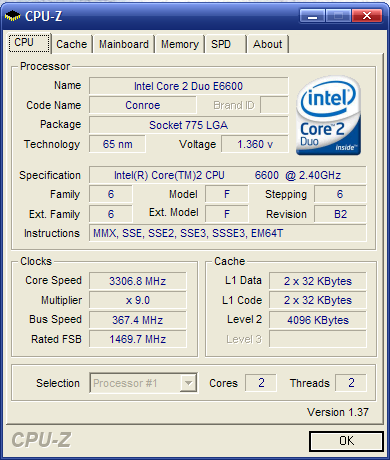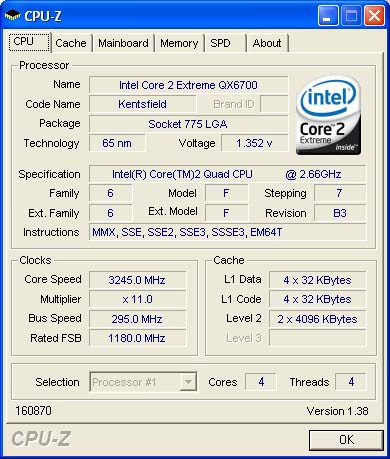Hi guys,
I have been overclocking my new Intel Core 2 Duo system. Here are the vital stats:
- Intel Core 2 Duo E6600 2.4GHz
- Asus P5W64 WS Professional motherboard
- 2GB Corsair TwinX DDR2-800 RAM (2 x 1GB modules)
- Arctic Cooling Freezer 7 Pro HSF
I have used the FSB to overclock, since the CPU multiplier is locked at 9. I have also been using RAM dividers to keep the memory between 800 and 900MHz. All voltages are standard.
At speeds of 2.9GHz and above, when I reboot, the PC shuts down completely and then starts up again after a second or two. Reducing the CPU clock speed stops this behaviour. It doesn't seem to be a problem - the PC is completely stable at 3.0GHz (and probaby much higher).
Has anyone seen this kind of behaviour before?
Cobra
EDIT - I also noticed that my temperatures increased from 49 deg C to 51 deg C under stress (folding on both cores, calculating Pi, encoding video, playing an MP3 and running RealStorm) even with this massive overclock. Weird!
+ Reply to Thread
Results 1 to 14 of 14
-
-
Looks like it's a feature of the bios (?), that when you overclock and reboot or exit the bios it does that. It may be BS but here is the link:
http://forum.vapochill.com/showthread.php?t=11940 -
That doesn't surprise me. For as much as I love Asus boards they certainly cram a lot of wierd "features" into their boads these days. I think it's the "Asus OC Profile" saving your OC settings before each reboot. I'm guessing the more aggressive the OC the more noticeable the save is. May be running some sort of system diagnostic on reboots then.
Why does it matter? How often do you need to reboot anyway? I just leave all my machines running 24/7.FB-DIMM are the real cause of global warming -
Thanks for the replies!
Rally - It doesn't matter in the slightest, but it is £1,200 of hardware and I was slightly concerned about the weird behaviour - I don't want to ruin it!
GKar - That link was most helpful. I don't seem to be the only person who has noticed this, and it doesn't appear to be worrying Asus, so I reckon it's OK.
Let the overclocking continue! -
I've arrived at a stable overclock. I could probably take it a lot further if I increased vCore, but I don't want to do that just now. I'm certainly happy - an additional 900MHz/core (+38% boost) isn't bad at all.


-
Wow, I feel like I'm in the dark ages compared to that system.....That (effective) front side bus is really something.
We humbly bow to the master.

I need to get back to my 28.8k dialup downloading......
-
Hardly - overclocking isn't difficult! My motherboard even has automatic overclocking options on it so you don't need to worry about the fine details. Even compared to my last machine (a couple of years back) overclocking has become a lot more simple.Originally Posted by GKar

-
My last overclocking adventure was with an Athlon XP 2500+ Barton on an Epox 8RDA3I nForce2 board with no tweaking except moving the FSB to 200 (400) from 166 (333) to make it run at 3200+. It's still running strong today (2+ years) with stock Vcore and no other tweaks, just Corsair PC 3200 ram. My primary system (ECS 755-A2 & Sempron 64 2800+) is essentially stuck at stock because it is ECS and they pretty much build those to be stable at rated speeds (some exceptions). I could move it up a little but not worth it. That board and cpu you have are awesome. Glad it is working out for you.

PS: I thought it was great that I had 3 phase power (Epox 8RDA3I) for my cpu, if I read correctly your board has 8 phase power! Should provide for the stability you are getting when overclocking. -
Consider yourself very lucky in getting such a highly overclockable processor !Originally Posted by Cobra
-
It must be karma. I bought a mobile XP2500+ Barton-core CPU and it was a rubbish overclocker. I progressed to an Athlon64 XP3500 and that too was a bit poor - only a boost of 200MHz or so.
With this CPU, I was actually worrying about it. Why was it going to high on standard vCore? Then, finally, at 3.6GHz, it froze during stress-testing. I backed it off to 3.3GHz to be safe.
I also got a reply from Asus, which I'll post here for any future reference:
Originally Posted by ASUS Tech Support -
My experience with stable overclocking is the mainboard is more important than the cpu (with proper heatsinking):
1) clean power to the cpu (3 phase or better)
2) Vcore adjustments
3) DDR voltage tweaks
4) control over agp/pci bus frequencies (even auto dividers are ok)
5) overall mainboard build
Epox amongst a few others seem to know how to build an overclocker's board. Asus usually is in the top group for overclocking stability. -
My ASUS P5B did that too... didn't read about it first, so it caught
me by surprise too.
Nice OC on that E6600... I have the E6400 and got 3.2Ghz stable
with a 400 bus speed x 8 multiplier for a 1600Mhz FSB (DDR2-
800 RAM). Everything I encode is faster than real time... it's great. -
Cobra is the one who talked me into waiting for the Conroe/Kentsfield CPUs to arrive from Intel. Last year I was seriously considering going with an Athlon 64 x2, having bought one for my wife and being thoroughly impressed with how it humiliated the Pentium D. But I waited. And glad I did.
Cobra and I have done some comparison benchmarking between our two machines. He's getting about 38% boost OC-ing, and I'm getting about 23%.
I really believe that the Conroe cores are all pretty close to being the same, and the only difference is locked-down clocks and multipliers. It's far easier and cheaper for Intel to develop one core and merely detune it for the slower advertised CPUs.
Throwing in the limitations I get from double the heat generation of Cobra's CPU, my OC-ing results are very close to what I would expect with having the same basic cores.
I've read about E6300, E6400, E6600 and E6700 CPUs all being stably overclocked to about the same range - 3.2 to 3.4 GHz. I don't think that's a coincidence.
Here's a screengrab of my validated CPUz:

Mine has the same cores as the E6700, just more of them.
No coincidence that it's also in the same 3.2 to 3.4 GHz range. In my case being at the lower end because of the 130W being generated.
So let me go out on a limb and say E6300 = E6400 = E6600 = E6700 = X6800. The only differences seem to be cache size and stock timing settings.
My advice to anyone looking at a Conroe: Buy the slowest one you can with the cache size you want, slap it on a good Asus motherboard that lets you tweak the speeds and voltages, and overclock the nuts off it!
-
Well the Pentium D was nothing but a glorified double-Prescott. It generated enough heat that you could use it as an element for a water heater. Would have been neat to heatpipe it into a french press built into the top of your PC case though...
I'm still waiting on what to build next. I can afford to OC more now since I no longer do mastering for clients. My PCs are my own now. Only problem is that other than my laptop I only see any of my PCs on the weekend so it's not yet worth it for me to build a new rig. Overclocking two x4 Woodcrests would be kinda neat.
I blew the caps on the DH800 a while back after sustaining 3.2/800 on the Prestonias. I had a first revision board (in fact one of the first DH800s shipped in North America) so the caps were a known weak spot. I never bothered to RMA it since it was working but bought a newer revision one as a backup for when the first one a-sploded. I think I was going to bronze the first one with a plaque with its low serial number FB-DIMM are the real cause of global warming
FB-DIMM are the real cause of global warming
Similar Threads
-
Help with HF200 (24p and 30p question) technical question
By Coldbricks in forum Camcorders (DV/HDV/AVCHD/HD)Replies: 1Last Post: 15th Jun 2010, 14:24 -
Overclocking, memory problems??
By HotDamn! in forum ComputerReplies: 26Last Post: 29th Apr 2010, 13:05 -
Does overclocking mess up on-board video ?
By SingSing in forum Newbie / General discussionsReplies: 5Last Post: 8th Aug 2009, 00:39 -
Age old question of VHS to DVD question...I still don't get it.
By saywhat? in forum Newbie / General discussionsReplies: 4Last Post: 10th Oct 2008, 23:43 -
overclocking a 6750...& sundrys
By RabidDog in forum ComputerReplies: 4Last Post: 6th Apr 2008, 09:53





 Quote
Quote